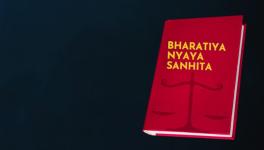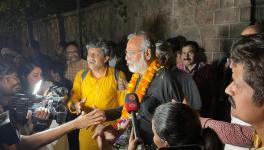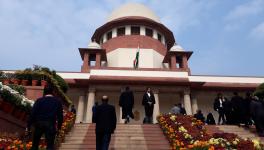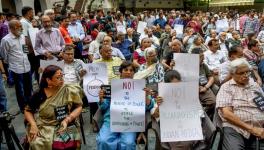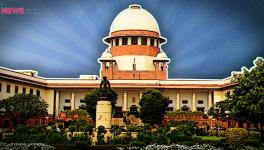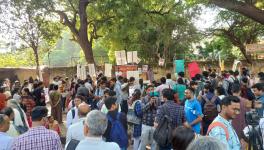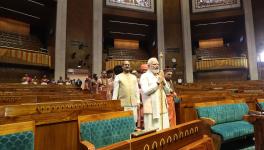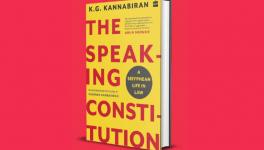Letters From Prison Before a Hanging
Should it have taken us this long to realise that the hanging of Afzal Guru by the state must be questioned? Why did we wait for last week’s arrest of police officer Davinder Singh to finally question this hanging? Why hold debates and discussions about whether his case should be reopened this late in the day?
Those who have read Nandita Haksar’s book, Framing Geelani, Hanging Afzal: Patriotism in the Time of Terror, published by Promilla Publishers in December 2007 in association with Bibliophile South Asia, can answer some of these questions. Reading it can also help realise that Afzal Guru was a victim and not a terrorist. He was trapped and targeted by the security agencies and also by the police; the likes of Davinder Singh.
In her book, Haksar is, as always, direct and forthright. She has detailed how Afzal Guru and his family were ruined and terrorised by Davinder Singh. She has also revealed who the other villainous characters in the saga were.
Haksar has written extensively about how Afzal Guru was severely tortured and humiliated whilst in custody. Right from the time he was brought to Delhi and kept in the lock-up of the Special Cell at Lodhi Road, where he was beaten and tortured. Her book records how “policemen urinated in his mouth and all over”. The torture got worse when he was imprisoned in Tihar Jail. His family also went through hell.
Another book by Haksar on the Kashmir situation, The Many Faces of Kashmiri Nationalism: From The Cold War to the Present Day, published by Speaking Tiger, deftly melds in Afzal Guru’s letters, including a 10-page handwritten note, with the narrative about the events in Kashmir. None of Afzal Guru’s letters, long or short, carry terrorising thoughts or sentiments. On the contrary, he comes across as philosophical, but loaded with definite positions on issues. For instance, Haksar records: “Though Afzal Guru had lived in the closed and claustrophobic cells of the Tihar Jail, his mind was open, and he continued to read extensively. Tabassum [Guru’s wife] said [that] after Ghalib [his son] was born, Afzal would complain ‘Waai pyaari mye mileha kanh goaph’—O pyaari, I wish I could find a cave to read in.
After his imprisonment, Tabassum would tease him, ‘Goaph mileye?’ or ‘Have you found the cave now?’ To this he would respond, ‘Zabardast goaph’ or incredible cave.
Haksar continues: “Guru wrote long letters to friends. Sometimes he would make copies and give me one or send it to me through his channels. Most of these letters were in English. In the letters he discussed his ideas about religion and nationalism. Like many other Kashmiri Muslims, Afzal too had become disillusioned by the idea of nationalism and had taken refuge in Islamist ideologies. For Afzal, both India and Pakistan had betrayed the Kashmiris. He was worried about the radicalisation of the new generation. He called it indoctrination and expressed his concern in a letter written from Jail No. 2, in Tihar Jail, to a fellow Kashmiri: ‘Our home is in a state of anarchy (morally, politically, socially etc), sandwiched between two antagonistic forces. One country is indoctrinating the highly-volatile kids, mobilising the noble feelings of these uneducated and unaware youth for their own existence and survival. They want to engage the huge army structure with a huge budget by a handful of highly-motivated people. On the other side, the Army wants to rest and to have a highly luxurious life. It is this hypocrisy that made few people to change the state of simmering of the pot into boiling state. It got boiled, but unfortunately these two countries do not learn. Rather, they do not want people to live in peace. They are living on the threshold of the same boiling stage. I was not alone nor am I. I do not belong to any organisation. I belong to feelings and ideas (felt globally) by those who are being humiliated and silenced unwillingly.’”
Afzal stands out in the letters as a well-read man who was constantly engaged in introspection and asking questions. “Afzal was wrestling with the ideas of religion and nationalism. In a long letter written to me on 8 January 2008, he asked, ‘Respected Nandita, when Naga conflict is not Christian why conflict in Kashmir is branded Islamic. Fundamentally it is political, social and historical in nature. Robert A Pape’s book, Dying To Win, has given a sophisticated analysis of 300 suicide attacks (from 1980 to 2003) out of which 76 were executed by the LTTE. The common cause he says is political and social injustice, oppression and brute policies of the political establishment and occupational powers’.”
In yet another letter, Afzal Guru writes on the ‘State’s senseless policies—the constant humiliation and trauma will ignite the heat of conflict. These policies will cultivate the militant and radical culture towards irreversible end. Police stations have become terror- and slaughter-houses. Families of killed people do not go to police station because it is the police station which is spreading the sense of terror into the hearts and minds of people. You may be feeling this exaggeration of state terror but this is a bitter fact of constitutional colony that is Kashmir.’”
Guru reasons why economic packages alone will not solve the problems in Kashmir. “Jesus son of Mary... says man cannot live by bread alone. Economic packages cannot bring peace in Kashmir. The people who are constantly living in the flux of humiliation and fear do not need bread for which Allah has given every person but a single mouth. What people need is a political framework in which they don’t feel vulnerable, humiliated or terrorised... The closure of all democratic means and vents will naturally push the educated youth towards radical wall.
“Noam Chomsky says that if we do not believe in the freedom of expression for the people we despise we don’t believe in it at all. RSS’s philosophy and its political, social and militant offshoots and offspring are communalising and polarising the whole political and social fabric and this culture of hatred is penetrating the other local institutions as well—and don’t exclude Tihar Jail. There is no doubt [Pakistan intelligence agency] ISI is also playing its role in this process through its devices of hatred. In fact, it is nurturing on anti -India rhetoric.”
The contents of a 10-page handwritten letter from Guru, written on 8 January 2008, make one sit up and question the very concept of death penalty. “In the end, I request you, don’t colourise or dress my words in any colour or dress except a purely responsible human concern for humanity… I am in the universe in such a way that I am myself the universe—I live in a space but I am space-less,” he wrote to Haksar.
The state hanged Mohammad Azfal Guru. Perhaps he was purposely silenced after the political players and the machinery under their control had used and abused him for their vested interests. We should prevent any further hangings of prisoners languishing in captivity. Hundreds of the imprisoned could be innocent. With biases running high, it is extremely tough going for the Kashmiri prisoners in particular. As Haksar has said: “The horrifying world Kashmiris inhabit: the terrifying reality of illegal arrests, dark damp prison cells and the barbarity of the torture and the pain of a child waiting for his father to be hanged.”
The writer is a freelance journalist. The views are personal.
Get the latest reports & analysis with people's perspective on Protests, movements & deep analytical videos, discussions of the current affairs in your Telegram app. Subscribe to NewsClick's Telegram channel & get Real-Time updates on stories, as they get published on our website.









